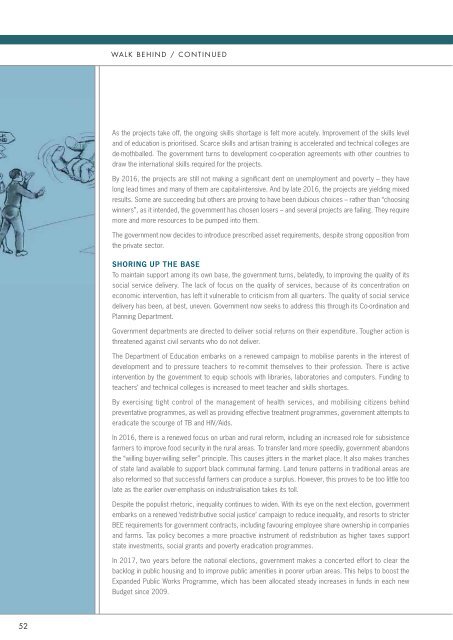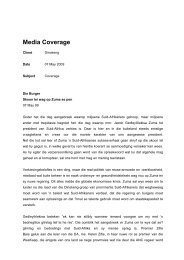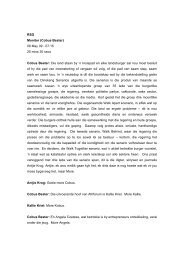Dinokeng Scenarios
Dinokeng Scenarios
Dinokeng Scenarios
You also want an ePaper? Increase the reach of your titles
YUMPU automatically turns print PDFs into web optimized ePapers that Google loves.
WALK BEHIND / CONTINUED<br />
As the projects take off, the ongoing skills shortage is felt more acutely. Improvement of the skills level<br />
and of education is prioritised. Scarce skills and artisan training is accelerated and technical colleges are<br />
de-mothballed. The government turns to development co-operation agreements with other countries to<br />
draw the international skills required for the projects.<br />
By 2016, the projects are still not making a significant dent on unemployment and poverty – they have<br />
long lead times and many of them are capital-intensive. And by late 2016, the projects are yielding mixed<br />
results. Some are succeeding but others are proving to have been dubious choices – rather than “choosing<br />
winners”, as it intended, the government has chosen losers – and several projects are failing. They require<br />
more and more resources to be pumped into them.<br />
The government now decides to introduce prescribed asset requirements, despite strong opposition from<br />
the private sector.<br />
SHORING UP THE BASE<br />
To maintain support among its own base, the government turns, belatedly, to improving the quality of its<br />
social service delivery. The lack of focus on the quality of services, because of its concentration on<br />
economic intervention, has left it vulnerable to criticism from all quarters. The quality of social service<br />
delivery has been, at best, uneven. Government now seeks to address this through its Co-ordination and<br />
Planning Department.<br />
Government departments are directed to deliver social returns on their expenditure. Tougher action is<br />
threatened against civil servants who do not deliver.<br />
The Department of Education embarks on a renewed campaign to mobilise parents in the interest of<br />
development and to pressure teachers to re-commit themselves to their profession. There is active<br />
intervention by the government to equip schools with libraries, laboratories and computers. Funding to<br />
teachers’ and technical colleges is increased to meet teacher and skills shortages.<br />
By exercising tight control of the management of health services, and mobilising citizens behind<br />
preventative programmes, as well as providing effective treatment programmes, government attempts to<br />
eradicate the scourge of TB and HIV/Aids.<br />
In 2016, there is a renewed focus on urban and rural reform, including an increased role for subsistence<br />
farmers to improve food security in the rural areas. To transfer land more speedily, government abandons<br />
the “willing buyer-willing seller” principle. This causes jitters in the market place. It also makes tranches<br />
of state land available to support black communal farming. Land tenure patterns in traditional areas are<br />
also reformed so that successful farmers can produce a surplus. However, this proves to be too little too<br />
late as the earlier over-emphasis on industrialisation takes its toll.<br />
Despite the populist rhetoric, inequality continues to widen. With its eye on the next election, government<br />
embarks on a renewed ‘redistributive social justice’ campaign to reduce inequality, and resorts to stricter<br />
BEE requirements for government contracts, including favouring employee share ownership in companies<br />
and farms. Tax policy becomes a more proactive instrument of redistribution as higher taxes support<br />
state investments, social grants and poverty eradication programmes.<br />
In 2017, two years before the national elections, government makes a concerted effort to clear the<br />
backlog in public housing and to improve public amenities in poorer urban areas. This helps to boost the<br />
Expanded Public Works Programme, which has been allocated steady increases in funds in each new<br />
Budget since 2009.<br />
52







